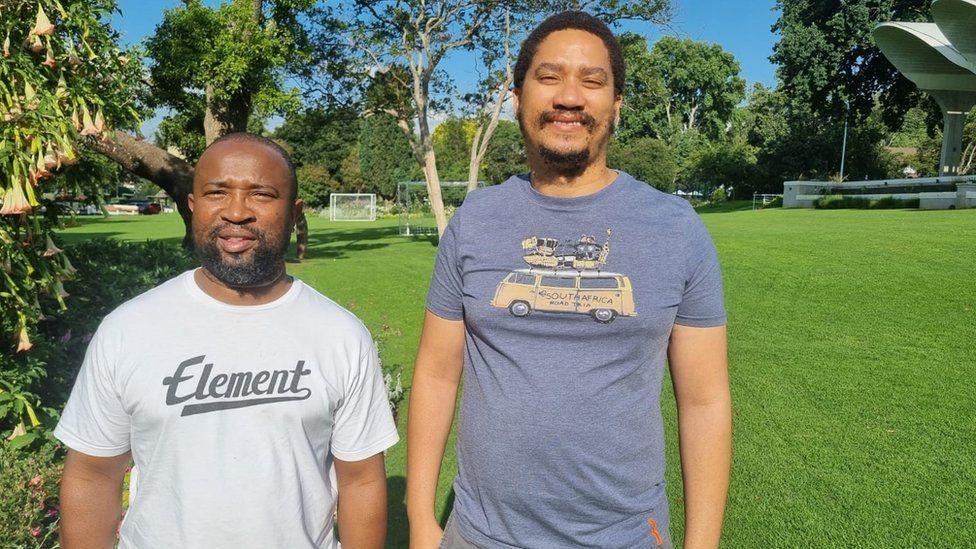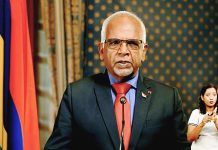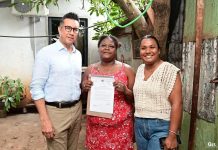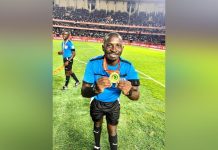Africa-Press – Mauritius. Software firm boss Stanford Mogotsi says he remains committed to South Africa, despite the challenges of running a small IT firm in the country. “It’s my home, I have a kid, I have a family here,” says the 46-year-old.
Mr Mogotsi co-owns Johannesburg-based software company Nane Solutions with his friend and business partner Kabelo Mashisi, 45. Both have come a long way since growing up in one of South Africa’s townships during apartheid.
Each studied computer science at university, and then spent a number of years in corporate IT jobs, before launching Nane in 2006. Their initial work was consultancy – advising firms such as MTN, South Africa’s largest mobile phone network, and state-owned power company Eskom.
But they found consulting frustrating because they wanted to build software from the ground up, rather than just advise. Their first major foray into designing software was creating a system for world football governing body Fifa to manage volunteers at the 2010 World Cup, which was held in South Africa.
Then in 2017 they created software that helped brewing group Heineken improve its transportation system in the country. Another big project win was developing an app for video phone service Talk360. Yet it hasn’t all been plain sailing for the firm. Nane means eight in Swahili, and the name was chosen because the company had eight founders.
However, the shift from consulting to the risker business of software development, and then the impact of South Africa’s tough coronavirus lockdowns, resulted in all but Mr Mogotsi and Mr Mashisi leaving the business.
“It’s really difficult to win work when you are a small firm,” says Mr Mogotsi.
“We have to compete with multinationals, and potential clients tend to want to go for these tried and tested big IT firms, especially when the economic backdrop in South Africa is uncertain.
Prof Duncan Coulter, head of the Academy of Computer Science and Software Engineering at the University of Johannesburg, agrees that times are difficult for South African IT companies like Nane.
While Mr Mogotsi and Mr Mashisi are staying in South Africa, Prof Coulter says that the continuing big problem for the country’s IT sector is a brain drain – people finding jobs overseas.
“A lot of our better students are now off in Europe, America and Asia, are doing very well for themselves, we’re very proud of them,” he says.
“And as part of the general brain drain [away from South Africa], they definitely have opportunities to move more easily than professions like lawyer and doctors.
As a result of all these young IT professionals finding work overseas, Prof Coulter says that firms in the sector in South Africa can now struggle to fill positions.
Mr Mashisi says that “salary-wise we can’t compete” with what large firms overseas can offer. “So as soon as someone’s got a year or two’s worth of experience, then it’s easy for them to be snapped up [and go abroad].
” New Tech Economy is a series exploring how technological innovation is set to shape the new emerging economic landscape.
Yet despite this brain drain, South Africa still has successful software start-ups that are producing popular products. An example of this is the app EskomSePush, which warns users across South Africa when to expect power cuts.
Such power cuts or “load-sheddings” are a regular occurrence in the country, due to the continuing energy generation shortfalls at power firm Eskom. Sometimes people have to go without power for 10 hours a day, and there’s no end in sight, with shortfalls due to continue until 2027.
EskomSePush is the brainchild of co-founders Dan Wells (35) and Herman Maritz, who launched the app in 2015 and run it from their Cape Town homes. It collects and processes complicated load-shedding schedules from Eskom and local governments across South Africa.
Notifications are then sent out to the app’s users telling them exactly when the power will be out in their neighbourhood and for how long. Mr Wells says that within six months of launching the app 250,000 people had downloaded it, “which was crazy back then”.
He adds that today the app is “on seven million devices, and about a million people will click on a notification almost immediately”. The app is monetised through advertising revenues, and Mr Wells’ advise for software developers is “gain a taste for having problems, find your community and solve some problems”.
If there is one thing that unites South Africans it is a love of sport, with cricket being the third most popular in the country. At the University of Johannesburg, computer science lecturer Tevin Moodley and Prof Dustin van der Haar, have developed a cricket video software system that aims to help produce the next generation of world-beating South African batsmen and women.
Its software can automatically identify the different strokes played by a particular batsman from a recording of a test match or other game. This means that a cricket coach can play numerous clips of a certain shot, without having to laboriously go through all the footage to first find them.
This allows quick analysis of the player’s execution of the shot in question, where they are standing, and their foot placements. From that, recommendations and improvements can be made, and young players can compare their performance with video recordings of former cricketing greats.
“My belief is if you’re able to improve the batter’s skill level, you’re able to improve your team’s chances of winning,” says Mr Moodley.
“So the impact of our work will be very big within the space of cricket.
”
At the moment, Mr Moodley uses YouTube clips of test matches to collect footage, but he hopes to work with Cricket South Africa to secure more videos.
While the software is currently still in the research stage, Mr Moodley says that given the right investors and stakeholders he would look to build a commercial product.
But in the meantime his focus is trying to help the next generation of South African cricketers. “I want to keep it local and try to help our team,” he says.
For More News And Analysis About Mauritius Follow Africa-Press







